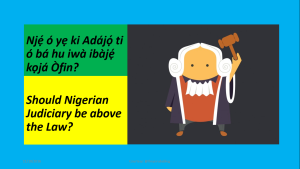
Ọ̀tẹlẹ̀múyẹ́ mú àwọn Adájọ́ ti wọn fi ẹ̀sùn iwà ibàjẹ́ kàn – DSS arrest of alleged corrupt Judges. Courtesy: @theyorubablog
Ni ọjọ́ Ẹti, ọjọ́ keje, oṣù kẹwa ọdún Ẹgbàálémẹ̀rindinlógún, ìròyìn pé àwọn Ọ̀tẹlẹ̀múyẹ́ já lu ilé àwọn Adájọ́ ti wọn fi ẹ̀sùn iwà ibàjẹ́ kàn jade lẹhin ti wọn ti dúró titi ki “Ẹgbẹ́ Adájọ́” gbé àwọn iwé ẹ̀sùn iwà ibàjẹ́ yẹ̀wò . Àwọn Ọ̀tẹlẹ̀múyẹ́ ròyìn pé wọn bá owó rẹpẹtẹ, pàtàki oriṣiriṣi owó òkè òkun, ni ilé awon Adájọ́ wọnyi. Lati igbà ti iroyin ti jade, àwọn ‘Ẹgbẹ́ Agbẹjọ́rò’ lérí pé àwọn yio da iṣẹ́ silẹ̀ ti Olóri Òṣèlú Muhammadu Buhari kò bá pàṣẹ ki wọn tú àwọn Adájọ́ naa silẹ̀ ni wéréwéré.
Ni ọ̀pọ̀lọpọ̀ ọdún sẹhin, Adájọ́ àti Agbẹjọ́rò ki i ṣe iṣẹ́ nitori àgbà ni ó ndá ẹjọ́ bi ijà bá bẹ́ silẹ̀ ni ilẹ̀ Yorùbá. Fun àpẹrẹ, bi àwọn ọmọdé bá njá, àgbàlagbà ti ó bá wà ni ilé ni yio là wọ́n, bi àwọn iyàwó-ilé bá njà, olóri ẹbi tàbi Àrẹ̀mọ ni yio la ijà. Bi ó bá jẹ́ ijà nitori ilẹ̀ oko, Baálẹ̀ Abúlé naa ni wọn yio kó ẹjọ́ lọ bá fún idájọ́, ti ó bá jẹ àdúgbò kan si ekeji ló njà, wọn á kó ẹjọ́ lọ bá Ọba ilú àti bẹ́ ẹ̀ bẹ́ ẹ̀ lọ. Lati wa idi òtitọ́, wọn lè kó àwọn ti ó njà lọ si ojúbọ Òriṣà lati búra. Lẹhin ti àwọn Ìlú-Ọba pin àwọn ọ̀pọ̀lọpọ̀ ilú àwọn Aláwọ̀dúdú, iṣẹ́ Agbẹjọ́rò di ki kọ́ ni ilé-iwé giga.
Kò si ọmọ Nigeria rere ti kò mọ̀ wi pé, ‘’Ẹ̀ṣẹ̀ nlá ijiyà kékeré tàbi ki ó má si ijiyà rara fún Olówó, ṣùgbọ́n ẹ̀ṣẹ̀ kékeré ijiyà nla ni fún tálákà tàbi aláìní’’, nitori iwà burúkú àwọn Adájọ́ ti ó ti gba àbẹ̀tẹ́lẹ̀ lọ́wọ́ àwọn Agbejoro. A ri gbọ́ wi pé bi “Ọ̀gá Àgbà Agbẹjọ́rò” bá ni ẹjọ́ ni iwájú Adájọ́ lẹhin ti ẹjọ́ agbejoro ti dé iwájú Adájọ́, wọn yio kọ́kọ́ gbọ́ ẹjọ́ ti “Ọ̀gá Àgbà Agbẹjọ́rò” gbé wá. Eleyi jẹ́ ikan ninú idi pàtàki ti ọ̀pọ̀lọpọ̀ Agbejoro ti fẹ́ fi ọ̀nàkọnà dé ipò “Ọ̀gá Àgbà Agbẹjọ́rò”. Ó yẹ ki wọn gbé eyi yẹ̀wò nitori ni ilú ti òfin bá wà, kò yẹ ki ẹnikẹni kọjá òfin. Ni Òkè-Òkun, Gó́́mìnà, àgbà Òṣèlú àti bẹ́ ẹ̀ bẹ́ ẹ̀ lọ kò kọjá òfin.
“Ẹni ma a bèrè ẹ̀tó lábẹ́ òfin yio lọ pẹ̀lú ọwọ́ mímọ́”, ẹ gb́e ọ̀rọ̀ yi yẹ̀wò bóyá bi wọ́n bá fi ẹ̀sùn iwà ibàjẹ́ kan Adájọ́, kò yẹ ki Ọ̀tẹlẹ̀múyẹ́ wa idi.
ENGLISH TRANSLATION
On Friday, the seventh of October, twenty-sixteen, news broke out that the Department of State Service (DSS) broke into the residence of Judges who were alleged for corruption after a long wait for the National Judicial Council (NJC) to address several petitions regarding corruption in the judicial system. DSS announced that large amount of money, particularly foreign currencies were recovered from Judges home. Since the news, members of the “Nigerian Bar Association (NBA)” called on President Muhammadu Buhari to release the arrested Judges immediately to avoid a show down with the Association.
According to the Yoruba culture, many years ago, professional Lawyers and Judges did not exist because disputes were settled by the ‘elders’. For example when children quarrel, the elders/first son in the family settles such, when fight broke out among the women/wives and other disputes in the family are settled by the ‘Head of the Family’, farmland disputes are settled by Community Leaders; neighbourhood fight are settled by the King etc. To investigate the truth, those in dispute are taken to the shrine to swear an oath about the matter in question. With colonisation of many African countries, people began to enrol for legal studies in the higher institutions.
There is no honest Nigerian that is not aware that “Serious crimes entails mild or no consequence for the elites or the rich ones while petty crimes attract heavy punishment for the poor Nigerians” as a result of corrupt Judges who are often bribed by the Lawyers. It has also been revealed that the “Senior Advocate of Nigeria (SAN)” cases in the Courts are given preferential treatment over other cases brought by other Lawyers/Advocates. This has led to the desperation by Lawyers to belong to this prestigious group at all cost.
One adage said “One who goes to equity must do so with a clean hand”, to put this into a discourse, should corrupt Judges be investigated by DSS or not?
Originally posted 2016-10-11 18:38:27. Republished by Blog Post Promoter



Ọ̀rọ̀ ỳí ti ń kọjá nǹkan tí èèyàn ń fi ojú féré wò. Ní ìlú tó ní ọba, tósì ní ìjòyè pẹ̀lu, tófin sì tún wà kí àwọn adájọ́ àgbà máa gba owó kọ́bẹ́ lọ́wọ́ àwọn olóṣèlu láti lèyi ìdájọ́ padà jẹ́ ohun tí a ní láti bu ẹnu àtẹ́ lù.
————
Ní ti bí àwọn bàbá wa ṣe ń ṣe ìdájọ́ láyé ọjọ́un: Ẹdùn ọkan lójẹ́ fún mi nígbà tí mo bá ríi pé díẹ̀ nínú àwọn akẹ́kọ̀ó ìmọ̀ òfin ni kò ní ọgbọ́n inu tó jinlẹ láti lè fi ṣe ìdájọ́ tí ó bá di pé wọ́n di adájọ́ lọ́la.
Ọ̀rò owó tí gbogbo ìlú ń pariwo ti da ǹkan ru. Kí Olódùmarè kó wa yọ kúrò nínú èyí tí a kó sí yìí nílẹ̀ wa.